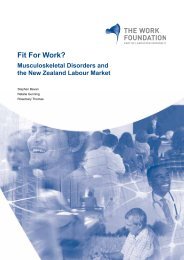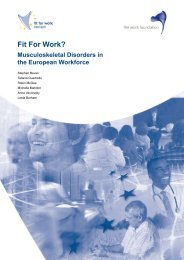FfW Bulgarian report (English language) - Fit for Work Europe
FfW Bulgarian report (English language) - Fit for Work Europe
FfW Bulgarian report (English language) - Fit for Work Europe
You also want an ePaper? Increase the reach of your titles
YUMPU automatically turns print PDFs into web optimized ePapers that Google loves.
2.2<br />
MSDs:<br />
The <strong>Europe</strong>an<br />
context<br />
Introduction<br />
• In 2010 about 13.3 per cent of males and 11.7 per cent of females of working age in<br />
Bulgaria were inactive due to illness or disability (Eurostat, n.d.). That is compared to<br />
16.8 and 11.8 per cent respectively <strong>for</strong> 2009 (Eurostat, n.d.).<br />
• A further 7.7 per cent of individuals of working age are out of work due to caring<br />
responsibilities (Eurostat, n.d.).<br />
• Musculoskeletal disorders (MSDs) accounted <strong>for</strong> 1005.2 hospitalisation cases per<br />
100,000 working age population (6.1 per cent) in 2004 (International Health Care and<br />
Health Insurance Institute, 2004).<br />
Despite the significant impact of health on the <strong>Bulgarian</strong> work<strong>for</strong>ce, demonstrated above,<br />
tackling high rates of musculoskeletal conditions among <strong>Bulgarian</strong> employees has not yet<br />
become a priority <strong>for</strong> policy-makers and employers. 6 It is important to raise awareness of direct<br />
and indirect costs of ill health <strong>for</strong> organisations and society to evaluate its potential long-term<br />
consequences.<br />
In the EU context, concern in the <strong>Europe</strong>an Commission and among the social partners over<br />
the prevalence and impact of work-related MSDs has been growing <strong>for</strong> several years. Chronic<br />
musculoskeletal pain is estimated to affect 100 million people in <strong>Europe</strong> (Veale, Woolf and<br />
Carr, 2008), MSDs affect more than 40 million workers in the EU and account <strong>for</strong> about half<br />
of all work-related disorders in EU countries (<strong>Europe</strong>an Trade Union Institute (ETUI), 2007),<br />
representing an estimated cost to society of between 0.5 and 2.0 per cent of gross domestic<br />
product (GDP) (Cammarota, 2005).<br />
The fourth <strong>Europe</strong>an <strong>Work</strong>ing Conditions Survey published by the <strong>Europe</strong>an Foundation<br />
(Parent-Thirion et al., 2007) has shown that 25 per cent of workers across the EU experience<br />
backache and 23 per cent <strong>report</strong> muscular pain. Indeed, the <strong>Europe</strong>an Commission estimates<br />
that MSDs account <strong>for</strong> 50 per cent of all absences from work lasting three days or longer and<br />
<strong>for</strong> 60 per cent of permanent work incapacity. If the <strong>Europe</strong>an, knowledge-based economy<br />
is to recover and compete against the US and the growing economies of Asia the health and<br />
productivity of the EU work<strong>for</strong>ce must be a policy priority. This <strong>report</strong> looks at Bulgaria in this<br />
wider EU context and assesses where Bulgaria is doing well and where it has challenges to<br />
confront. In addition, Appendix 3 compares labour market, welfare and health care systems<br />
indicators across a number of <strong>Europe</strong>an countries.<br />
6 Expert interview<br />
<strong>Fit</strong> For <strong>Work</strong>? 13







